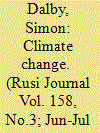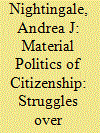|
|
|
Sort Order |
|
|
|
Items / Page
|
|
|
|
|
|
|
| Srl | Item |
| 1 |
ID:
122255


|
|
|
|
|
| Publication |
2013.
|
| Summary/Abstract |
Climate change has added new impetus and urgency to the long-running discussion of environmental security, leading to an emphasis on the overall transformation of planetary systems. In this article, Simon Dalby argues that this requires consideration of three themes in particular: urban vulnerabilities to extreme events; the unforeseen social and political consequences of adaptation and mitigation efforts; and the possibilities of geo-engineering. Furthermore, given the increasingly artificial circumstances that the global economy is creating, security planners should now focus on the consequences of further expansion of the carbon-fuelled global economy, rather than on concerns about political instabilities in the rural peripheries caused by resource conflicts.
|
|
|
|
|
|
|
|
|
|
|
|
|
|
|
|
| 2 |
ID:
168821


|
|
|
|
|
| Summary/Abstract |
Examining the boundaries of state–society–citizen–environment after the federal restructuring in Nepal, we ask how do people claim authority or citizenship rights? We theorise state power through the socio-environmental state framework as a set of socio-natural relations in the making, formed by struggles over authority, recognition and environment. Using qualitative data from Barpak, the epicentre of the 2015 earthquake, we capture the politics of natural resource governance that (re)emerged during earthquake reconstruction and local-level elections, illustrating how control over resources is negotiated, disputed, and inscribed in law (land titles and water sources) and landscapes (water sources, earthquake resettlement area, an open-air museum).
|
|
|
|
|
|
|
|
|
|
|
|
|
|
|
|
| 3 |
ID:
171322


|
|
|
|
|
| Summary/Abstract |
Conflicts between sedentary farmers and nomadic pastoralists (herders) are a common phenomenon in Africa. In recent scholarship, environmental change, structural violence and capital flows to agro-pastoral communities are identified as the core conflict drivers. Although scholars differ on the exact causal pathways, most arguments ultimately centre around competition over access to water and land. Yet there is a lot more to learn about the ecology of these conflicts, especially people’s perception of pastoral nomads and its implication for conflict resolution. The tendency among researchers is to explore the conflict as if it comprises only objective realities devoid of subjective beliefs. Yet my research shows that popular representations of Fulani herders in Nigeria today reflect ancient stereotypes of nomadic peoples. By ignoring this subjective dimension of the conflict, we limit our understanding of its causes and the reason(s) behind its protraction, and, by extension, are blinded to the need for prejudice reduction. This paper argues that the perception of pastoral nomads as savages is a factor in the conflict because it shapes people’s relationship with, and reception of, Fulani herders. Hence, it must be grasped, probed and included in the visioning of conflict resolution.
|
|
|
|
|
|
|
|
|
|
|
|
|
|
|
|
| 4 |
ID:
183233


|
|
|
|
|
| Summary/Abstract |
It is widely assumed that authoritarian states tend to use repression to suffocate social conflicts that threaten regime stability. Focusing on the Chinese state's responses to resource conflict, a particular type of social conflict triggered by mineral resource extraction, this research argues that authoritarian regimes may prefer to use redistributive policies to defuse social unrest under certain circumstances. Through mixed methods combining qualitative research and statistical analysis, I find that local governments in resource-rich regions do not spend heavily on coercive state apparatus. Instead, they generously hand out social security benefits to appease aggrieved citizens. Furthermore, the Chinese state actively involves mining companies in the redistribution process and requires them to share the financial costs of relief policies. Therefore, when conflicts arise between specific social groups with conflicting interests, redistribution may be a more effective strategy to preserve regime stability.
|
|
|
|
|
|
|
|
|
|
|
|
|
|
|
|
|
|
|
|
|